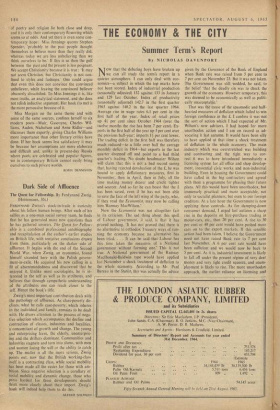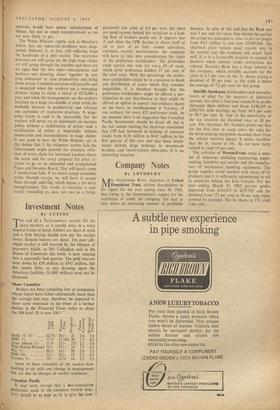THE ECONOMY & THE CITY
Summer Term's Report
By. NICHOLAS DAVENPORT
Now that the debating boys have broken up we can all study the term's report in a quieter atmosphere. I can only deal with eco- nomics—a subject in which the top marks have not been scored. Index of industrial production (seasonally adjusted) 132 against 133 in January and 129 last October. Index of productivity (seasonally adjusted) 142.7 in the first quarter 1965 against 140.2 in the last quarter 1964. Average rise in wage rates 6.1 per cent in the first half of the year. Index of retail prices up 44 per cent since October 1964 (over the twelve months the rise has been 7 per cent). Ex- ports in the first half of the year up 3 per cent over the previous half-year; imports 14 per cent lower. The trading deficit in the first half was therefore much reduced—to a little over half the average monthly deficit in 1964—but exports in the last quarter dropped off and point to a bad third quarter's trading. No doubt headmaster Wilson will claim that this is not a bad record seeing that, having rejected devaluation of the £, he was bound to apply deflationary measures, first in November, then in April, then in July, all the time making money dearer and credit tighter and .scarcer. And so far he can boast that the £ has been saved, even if he has not been able to save the face of the left wing of the party, who, if they read the Economist, may now be calling him 'Ramsay MacWilson.'
Now the Economist was not altogether fair in its criticism. The sad thing about this spell of Labour government, it said, is that it has proved nothing. 'It has not proved that there is no alternative to orthodox Treasury ways of run- ning the economy because no alternative has been tried. . . . It can be said that Labour has this time taken the measures of a National government without forming one.' This is not true. A National government of the Ramsay MacDonald-Baldwin type would have applied last November a shock treatment of deflation to the whole economy. According to Mr. Paul Bareau in the Statist, this was actually the advice given by the Governor of the Bank of England when Bank rate was raised from 5 per cent to 7 per cent on November 23. But it was not taken. The Government was still, wedded, he said, to the belief 'that the deadly sin was to check the growth of the economy. However temporary, this was deemed to be economically as well as politi- cally unacceptable.'
That was the cause of the spasmodic and half- hearted measures of deflation which failed to win foreign confidence in the £. I confess it was not the sort of action which I had expected, of Mr. Wilson's new advisers. I had hoped for more unorthodox action and I am on record as ad- vocating it last autumn. It would have been silly to have applied at that time a shock treatment of deflation to the whole economy. The main industry which was overstretched was building and contracting and the right way to cor- rect it was to have introduced immediately a licensing system for all office and shop develop- ment, inessential civic works and non-industrial building. Even in housing the Government could have called in the big contractors and agreed with them a programme for phasing their future plans. All this would have been unorthodox, but immensely practical and more acceptable, not only to socialist planners, but even to our foreign creditors. At a late hour the Government is now applying these controls. As for damping-down consumer demand, I urged last autumn a sharp rise in the deposits on hire-purchase trading in motor-cars, etc., then 20 per cent. A rise to 30 per cent or 40 per cent would have pushed more cars on to the export markets. If this sensible action had been taken, I believe the Government need not have raised Bank rate to 7 per cent last November. A 6 per cent rate would have been sufficient and we would now be back to 5 per cent. As it is, industrial investment is likely to fall off under the present regime of very dear money and very tight credit squeeze, and unem- 'ployment is likely to rise. The more unorthodox approach, the earlier reliance on licensing and
controls, would have meant redeployment of labour, but not so much unemployment as we are now likely to get.
The Prime Minister rightly said in Monday's debate that our industrial problems were deep- seated. Industry is, in fact, still suffering from the handicaps of a split society. The restrictive practices are still going on, the high wage claims are still going through the pipeline and there are no signs that the two sides—management and workers—are drawing closer together in any joint endeavour to raise productivity and bring down prices. Complete cynicism still prevails and is deepened when the workers see a managing director trying to claim a salary of £270,000 a year and when the managements see the workers insisting on a wage rise double or even treble the probable increase in productivity and refusing any surrender of restrictive practices. A wage- price freeze is said to be impossible, but the workers will never try to implement an incomes policy without a stabilisation of prices—and a stabilisation of prices is impossible without moderation and reasonableness in wage claims. It was good to hear the Prime Minister say in this debate that if the voluntary system fails the Government might provide for statutory refer- ence of ,every claim for increased incomes above the norm and for every proposal for price in- crease to go to an expanded and strengthened Prices and Incomes Board. That will surely come if moderation fails. If we won't accept economic truths through reason, we will have to accept them through suffering, which means a lot more unemployment. The world, as everyone is con- stantly reminding us, does not owe us a living.































 Previous page
Previous page